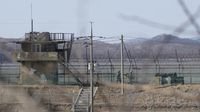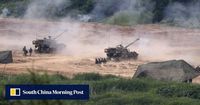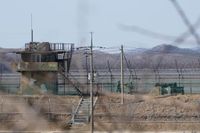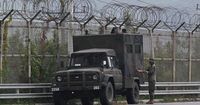SEOUL, South Korea (AP) — In a significant escalation of tensions on the Korean Peninsula, South Korea's military fired warning shots on Tuesday after about 10 North Korean soldiers crossed the heavily fortified border, marking the first known border intrusion by the North in nearly a year. The incident occurred around 5 p.m. local time in the eastern section of the Demilitarized Zone (DMZ), a region notorious for its military presence and historical animosities.
The South Korean Joint Chiefs of Staff confirmed that the North Korean troops violated the military demarcation line (MDL) within the DMZ, prompting immediate action from the South. Following the incursion, South Korea broadcast warnings and discharged warning shots, leading the North Korean soldiers to retreat back to their territory. Notably, some of these soldiers were reportedly armed, raising concerns about the potential for violence.
While this incident has raised alarms, experts believe it may not escalate into a broader conflict. The South Korean military indicated that the incursion likely wasn’t intentional, as the area where the soldiers crossed is wooded, and the signage marking the border is not always clear. South Korea's military has been closely monitoring the situation, stating, "Our military is closely monitoring the North Korean military's activity and taking necessary measures according to the operational procedures."
This latest border crossing follows a series of military exercises conducted by North Korea, with approximately 1,500 personnel reported to be engaged in reinforcing barbed wire and conducting land operations inside the DMZ just a day prior to the incident. South Korea's military had noted in late March that North Korea was resuming front-line works, including strengthening border defenses.
The DMZ, stretching 248 kilometers (155 miles) in length and 4 kilometers (2.5 miles) in width, is one of the world's most heavily militarized borders, laden with an estimated 2 million landmines and fortified with barbed wire and combat-ready troops from both sides. This heavily armed zone is a remnant of the Korean War, which ended in 1953 with an armistice rather than a formal peace treaty.
Historical context plays a significant role in understanding the current tensions. In June of last year, North Korean troops had violated the border three times, leading South Korea to fire warning shots. However, those incidents did not escalate into major confrontations, as the South assessed that the North Korean soldiers had not deliberately committed the intrusion. Observers suggested that the North Korean soldiers may have accidentally crossed the border while engaged in construction activities aimed at enhancing their military defenses.
Amid these tensions, North Korean leader Kim Jong Un has been bolstering military ties with Russia, particularly in light of President Vladimir Putin's ongoing war in Ukraine. This collaboration has raised concerns in both Seoul and Washington, especially as Kim continues to ignore calls for denuclearization negotiations. Despite recent remarks from U.S. President Donald Trump indicating a willingness to engage diplomatically with North Korea, the North has remained silent, accusing the U.S. of escalating hostilities since Trump's inauguration.
As South Korea navigates this precarious situation, it is also grappling with its own internal challenges. The recent ousting of President Yoon Suk Yeol, following his controversial imposition of martial law and push to expand military drills with the U.S., has created a leadership vacuum. This political instability could further complicate South Korea's response to North Korean provocations.
In conclusion, while the recent border incursion by North Korean soldiers has heightened tensions on the Korean Peninsula, the lack of immediate escalation suggests that both sides may be cautious. The situation remains fluid, and the international community is closely watching how these developments unfold.







